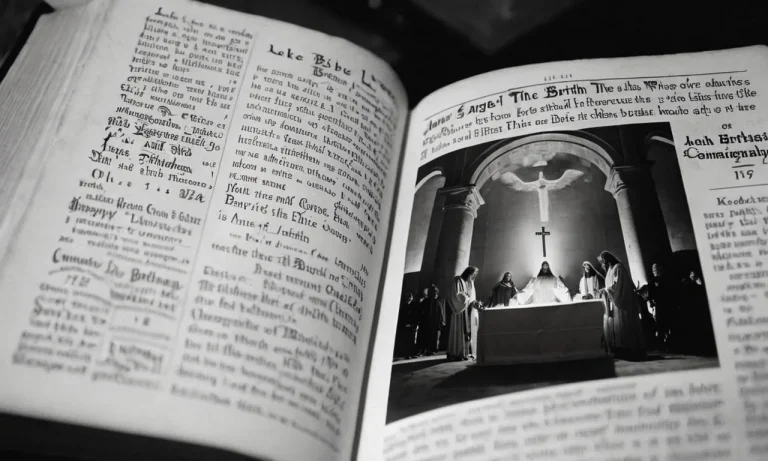Which Christian Denomination Is Right?
With over 40,000 Christian denominations worldwide, many followers of Christ wonder which one has the right beliefs and practices. This comprehensive guide examines the key theological differences between the major Christian denominations and helps readers determine which aligns most closely with their own interpretation of scripture.
If you’re short on time, here’s a quick answer to your question: No one Christian denomination has the definitive correct theology according to scripture. Each has strengths and weaknesses in their doctrine and practice. Evaluate your priorities and find the church that best aligns.
The Major Branches of Christianity
Christianity is the largest religion in the world, with over 2.3 billion followers. It is divided into several branches, each with its own unique beliefs, practices, and traditions. The three major branches of Christianity are Roman Catholicism, Eastern Orthodoxy, and Protestantism.
Roman Catholicism
Roman Catholicism is the largest Christian denomination, with over 1.3 billion members worldwide. It traces its origins back to the time of Jesus Christ and the apostles. The Pope, who is based in Vatican City, serves as the spiritual leader of the Roman Catholic Church.
Catholics believe in the authority of the Pope, the sacraments, and the importance of tradition. They also venerate saints and believe in the doctrine of purgatory.
The Catholic Church places a strong emphasis on the Virgin Mary and the saints, and Catholics often pray to them for intercession. The Mass is the central act of worship for Catholics, where they believe in the real presence of Jesus Christ in the Eucharist.
The Catholic Church also upholds the belief in the infallibility of the Pope on matters of faith and morals.
Eastern Orthodoxy
Eastern Orthodoxy is the second-largest Christian denomination, with around 300 million adherents. It originated in the Byzantine Empire and is characterized by its rich liturgical traditions and mystical spirituality.
The Eastern Orthodox Church is decentralized, with several autocephalous (self-governing) churches, each led by a patriarch or metropolitan.
Eastern Orthodox Christians believe that Jesus Christ is the Son of God and the second person of the Holy Trinity. They place a strong emphasis on the sacraments, especially the Eucharist, which they believe is the real presence of Christ.
The Orthodox Church also venerates icons, which are considered sacred and are used in worship and personal devotion.
Protestantism
Protestantism is a diverse group of Christian denominations that originated in the 16th century during the Protestant Reformation. It includes various traditions such as Lutheranism, Anglicanism, Presbyterianism, Baptist, Methodist, and many others.
Protestants reject the authority of the Pope and emphasize the authority of the Bible.
Protestants believe in justification by faith alone, the priesthood of all believers, and the importance of personal relationship with God. They emphasize the preaching of the Word and place less emphasis on sacraments compared to Catholicism and Orthodoxy.
Protestant worship services vary widely, ranging from formal liturgies to more contemporary styles of worship.
It is important to note that while these three branches of Christianity share common beliefs in the divinity of Jesus Christ and the importance of the Bible, they also have significant theological and cultural differences.
Each branch has its own distinct practices and traditions that have developed over centuries. Ultimately, the question of which Christian denomination is right is a matter of personal belief and interpretation of Scripture.
Key Theological Differences
Scripture vs Tradition
One of the key theological differences between Christian denominations is the role of Scripture versus tradition. Some denominations, such as Protestant ones, place a strong emphasis on the authority of Scripture alone as the ultimate source of truth.
They believe that the Bible is the inspired word of God and should be the sole guide for faith and practice. On the other hand, Catholic and Orthodox denominations also recognize the authority of tradition, viewing it as an important source of interpretation and understanding of Scripture.
They believe that the teachings and practices passed down through the centuries by the early Church and its leaders are to be upheld alongside Scripture.
Salvation
Another significant theological difference among Christian denominations is the understanding of salvation. While all Christian denominations believe in the concept of salvation through Jesus Christ, they may differ in their understanding of how it is obtained.
Some denominations, like Calvinist ones, emphasize the concept of predestination, where God has already determined who will be saved and who will not. Others, such as Arminian denominations, believe in free will and that individuals have the ability to accept or reject God’s salvation.
There are also denominations that hold a more inclusive view, believing that salvation is available to all people regardless of their religious affiliation.
Baptism
The practice of baptism also varies among Christian denominations. Some denominations, like the Catholic Church, practice infant baptism, believing that it is necessary for the forgiveness of original sin and the initiation into the Christian community.
Other denominations, such as Baptist churches, practice believer’s baptism, where individuals are baptized after making a personal profession of faith. Additionally, there are denominations that recognize both infant and believer’s baptism, allowing individuals to choose when they feel ready to be baptized.
Communion
Christian denominations also differ in their understanding of the sacrament of communion or the Eucharist. Some denominations, like the Catholic and Orthodox churches, believe in the doctrine of transubstantiation, which holds that the bread and wine used in communion become the actual body and blood of Christ.
Other denominations, such as Protestant ones, believe in the concept of consubstantiation or memorialism, where the bread and wine symbolize the body and blood of Christ and serve as a remembrance of his sacrifice.
Church Governance
The structure and governance of the Church is another area of theological difference among Christian denominations. Certain denominations, like the Catholic Church, have a hierarchical structure with bishops, priests, and deacons, and believe in the authority of the Pope as the head of the Church.
Other denominations, like Presbyterian churches, have a representative form of governance, where decisions are made collectively by elders and ministers. Still, other denominations, such as Baptist churches, have a congregational form of governance, where each individual church is autonomous and makes its own decisions.
Mary and the Saints
The veneration of Mary and the saints is also a point of divergence among Christian denominations. Catholic and Orthodox denominations hold a high regard for Mary as the mother of Jesus and believe in the intercession of saints, requesting their prayers and believing that they can provide assistance and guidance.
Protestant denominations, however, do not venerate Mary or the saints in the same way and believe in approaching God directly through Jesus Christ without the need for intercession.
Choosing a Denomination
When it comes to choosing a Christian denomination, it can often feel overwhelming. With so many different beliefs, practices, and traditions, how do you know which one is right for you? While the answer to this question ultimately depends on your personal convictions and relationship with God, there are several steps you can take to help guide your decision.
Study Scripture and Church History
One important step in choosing a denomination is to study scripture and church history. This will help you understand the different theological perspectives and doctrinal beliefs held by various denominations.
By immersing yourself in the Word of God and learning about the historical development of Christianity, you can gain valuable insights into the different approaches to faith.
There are many resources available to help you in this study. Websites such as Got Questions and Catholic Answers offer articles, books, and podcasts that can provide valuable information on different denominations and their beliefs.
Attend Various Churches
Another helpful step in choosing a denomination is to attend various churches. Experiencing firsthand the worship styles, preaching, and community dynamics of different denominations can give you a better sense of where you feel most at home.
Don’t be afraid to visit churches outside of your comfort zone – you may be pleasantly surprised by what you discover!
Evaluate Doctrine and Practice
When considering a denomination, it’s important to evaluate both its doctrine and practice. Look closely at what the denomination believes about essential Christian doctrines such as the Trinity, salvation, and the authority of Scripture.
Consider also how these beliefs are lived out in the practical aspects of church life, such as worship, sacraments, and service to others.
Comparing the doctrines and practices of different denominations can be done using a table or chart. This can help you see the similarities and differences more clearly. It’s important to remember that no denomination is perfect, and every one will have its strengths and weaknesses.
The key is to find one that aligns with your core beliefs and values.
Examine Your Priorities and Convictions
As you navigate the process of choosing a denomination, it’s essential to examine your own priorities and convictions. Consider what aspects of the Christian faith are most important to you and what you feel called to in your spiritual journey. Are you passionate about social justice?
Do you value deep theological study? Are you drawn to a particular style of worship? Understanding your own preferences and priorities will help guide your decision.
Pray for Wisdom and Discernment
Above all, as you seek to choose a denomination, it’s crucial to pray for wisdom and discernment. Ask God to guide you in your decision-making process and to reveal His will to you. Remember that God knows the desires of your heart and wants what is best for you.
Trust in His leading and be open to the ways He may be speaking to you.
Choosing a denomination is not a decision to be taken lightly, but with careful consideration, prayer, and an open heart, you can find a community of believers that will support and nurture your faith journey.
Remember that the most important thing is to seek a relationship with Jesus Christ and to love God and others with all your heart, regardless of the denomination you choose.
Conclusion
With prayerful study and discernment, Christians can determine which denomination most closely aligns with their personal convictions. While no church is perfect, believers should seek the one where they can best understand and live out scriptural truth.
Ultimately, love and unity among followers of Christ transcend denominational divisions.








